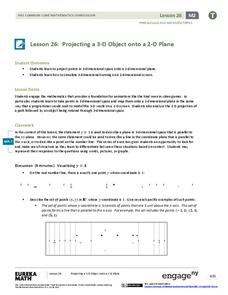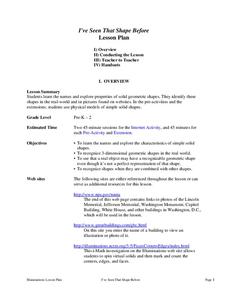Illustrative Mathematics
3-D Shape Sort
From the apple on your desk and the coffee cup in your hand, to the cabinets along the classroom wall, basic three-dimensional shapes are found everywhere in the world around us. Introduce young mathematicians to the these common figures...
EngageNY
Projecting a 3-D Object onto a 2-D Plane
Teach how graphic designers can use mathematics to represent three-dimensional movement on a two-dimensional television surface. Pupils use matrices, vectors, and transformations to model rotational movement. Their exploration involves...
Curated OER
3-D Figures Part 1
Elementary schoolers explore 3-D shapes. They transition from thinking of shapes as only 2-D. Pupils read Cinderella as a launching activity for their upcoming adventure, and explore a new world of 3-D shapes in this introductory lesson.
Mathematics Assessment Project
Representing 3-D Objects in 2-D
How does the shape of the surface of water in a container change as water leaks out? After tackling this question, learners take part in a similar activity with more complex figures.
Curated OER
2-D and 3-D Presents at Pedro's Party
Fifth graders draw 2-D and 3-D shapes. They sketch and label geometric figures with correct terminology, then explore parallel and perpendicular lines. Pupils sort and classify shapes drawn.
Curated OER
Three-Dimensional Objects
Fourth graders view and identify three-dimensional figures. They analyze and discuss various figures, build three-dimensional figures, and complete various worksheets and worksheet discussion questions.
Curated OER
Applied Science - Science and Math Lab
Create three dimensional objects in an applied science lesson plan. The goal is for your class to recognize, compare, and model shapes. Using cookie cutters and clay or play dough, they create models for three-dimensional shapes.
Curated OER
Mastering Math Vocabulary- The Three Bears
Integrate reading and math to increase your class' vocabulary. Read The Three Bears by Paul Galdone. Then have your third graders complete a worksheet containing math problems related to the story.
Space Awareness
What is a Constellation
Why do some stars in a constellation appear brighter than others? Using a get-up-and-move astronomy activity, scholars explore perspective and the appearance of constellations in the sky while developing an understanding of the...
Fayetteville Public Schools
I've Seen That Shape Before
The objectives in the resource allow young scholars to explore the characteristics of simple solid shapes. Youngsters learn to recognize the face shapes, corners, and edges that make up 3-D figures by filling in a chart....
Pennsylvania Department of Education
Shapes Around Us
Learners use manipulatives to study shapes. They sort shapes and use correct geometric terminology to describe them. Students find real-life examples of 2 and 3 dimensional shapes, and classify figures in their classroom according to...
Curated OER
3-D Attributes
Students explore geometric solids. In this geometry lesson, students listen to the book The Greedy Triangle by Marilyn Burns, then work in groups to sort geometric solids into various categories. Students define geometric solids...
Curated OER
It's a 3-D World Out There!
Students construct polygons. They identify attributes of three-dimensional shapes. Students name common three-dimensional shapes. They draw three-dimensional shapes, and sort three-dimensional shapes. Students use K'NEX materials sets to...
Curated OER
3-D Figures Part 2
Students work with three dimensional objects. In this geometry lesson, students examine models of spheres, cones, cubes, prisms, and pyramids, and identify them by their edges, vertices, and faces.
Curated OER
Living in a Geometrical World
Students participate in a series of hand-on, online, and multimedia activities to examine 2 dimensional and 3 dimensional shapes. They describe common geometric solids. They construct rectangular prisms using straws and ribbon.
Curated OER
Can You Name That Shape?
Learners use materials to build, investigate, and draw two-dimensional shapes (polygons). They combine the shapes they have built and draw from the pile to begin a round-robin activity to name and determine the attributes of a selection...
Bonneville
Engineering 101
Make a structure too sturdy to fail. Scholars first watch a video and consider the reasons for the Tacoma Narrows bridge collapse. They take part in two engineering challenges, one using newspapers and the other using spaghetti sticks...
Curated OER
Circles 1, 2, 3, 4
Here is a way to help your charges identify circles and spheres. In this shapes geometry and technology lesson plan, students identify and draw circles and explain the related attributes. They recognize circles and spheres while...
Civil War Trust
Civil War Photography: Photography as a Primary Source
Can we learn a thing or two about history by looking at pictures from the past? As young historians view 2-D and 3-D primary source photographs, they respond to a series of worksheets that guides them toward unveiling clues...
Curated OER
Geometry and Measurement
Young geometers explore relationships between units of measure and objects. Three activities provide varied opportunities to practice. Learners calculate the volume of two cylinders made by rolling a piece of paper vertically and...
Pennsylvania Department of Education
A Geometric Scavenger Hunt
Fifth graders connect their knowledge of polygons and polyhedrons. For this geometric shapes lesson, 5th graders identify and classify two- and three-dimensional objects. Students construct a polyhedron out of polygons and describe their...
Curated OER
Tomato Exploration
Create tomatoes in 15-20 minutes using this fun and interactive lesson plan! Learners listen to a book about tomatoes (recommendations listed), and focus on the vocabulary word tomato. They count the syllables...
ReadWriteThink
Teaching Point of View With Two Bad Ants
What better way to explain the concept of point of view than from an ant's perspective! After reading Two Bad Ants, pupils identify the point of view of the ants by studying the text and pictures. Then, they fill out a...
Curated OER
Great Shapes Alive!
Compare two- and three-dimensional shapes and construct three dimensional models from two-dimensional shapes. Diagram the shapes and reflect about the process in writing.























